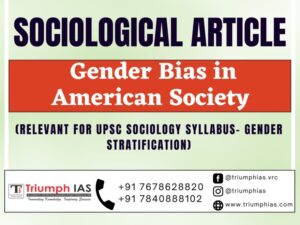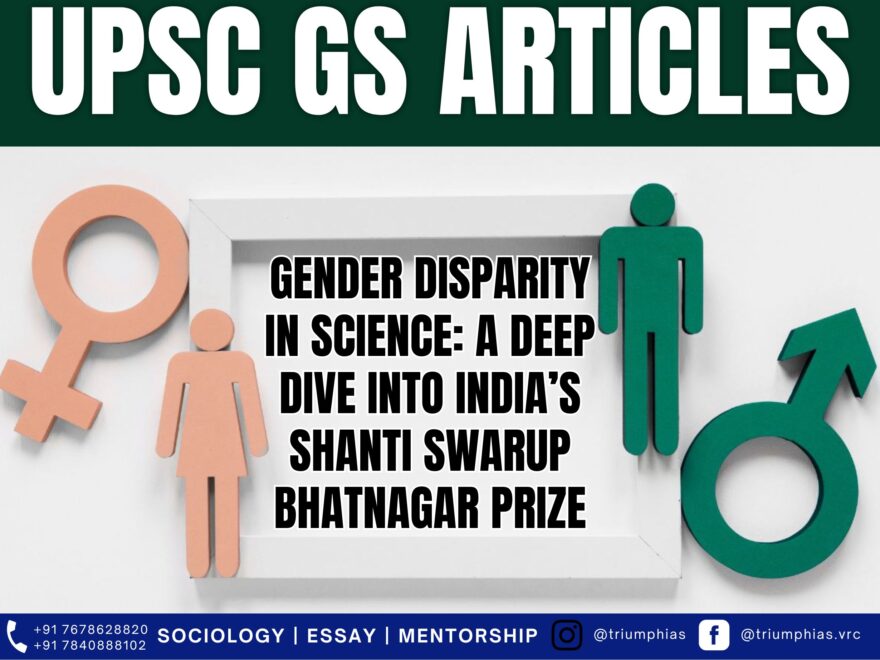Inequality in science:
Gender disparity in science
(Relevant for General Studies Paper Prelims/Mains)

Inequality in science: Gender disparity in science
Recently, the Council of Scientific and Industrial Research (CSIR) unveiled the list of recipients for the Shanti Swarup Bhatnagar Prize for 2022. Notably, no female scientists were selected for the SSB Awards in 2022.
This prestigious award is well-known for its significant impact on the recipients’ scientific careers and the enhanced reputation it bestows upon their respective institutions. However, it has faced criticism due to its consistent failure to acknowledge and honour the achievements of women scientists. Despite its stature in the scientific community, the prize has repeatedly overlooked the contributions made by female scientists.
Shanti Swarup Bhatnagar Prize
|
Criticism against SSB Awards
- Gender Disparity: The SSB Prize faces a glaring gender disparity issue, as the most recent batch of winners in both 2021 and 2022 exclusively comprised male scientists. This highlights the ongoing underrepresentation of women in this award category.
- The fact that women make up only about 14% of India’s working scientists underscores a significant gender imbalance within the realm of science.
- Absence of Female Awardees: In the past two years, despite recognizing numerous scientists for their exceptional contributions, the CSIR has failed to identify a single woman scientist who has made a sufficiently noteworthy impact in the field of science and technology.
- Inclusivity in the Field: Out of nearly 600 SSB prizes awarded, only 19 have gone to women scientists, underscoring a long-standing historical gender disparity in the award’s history.
- This continuous lack of acknowledgment for women’s contributions in science raises concerns about inclusivity and gender equality within the scientific community.
- Transparency Concerns: The composition of the Advisory Committee responsible for selecting SSB Award recipients has traditionally been shrouded in secrecy, rendering it impervious to public accountability and scrutiny.
- This lack of transparency can further perpetuate biases and impede efforts to address gender disparities.
- Nominations by Predominantly Male Figures: To qualify for the award, a scientist must be nominated by individuals holding influential positions, including vice-chancellors, directors, academy presidents, deans, CSIR governing body members, and past winners.
- It is worth noting that a significant majority of these nominators are male, potentially introducing bias against nominating their female colleagues.
Causes of the Underrepresentation of Women in Science
- Societal Stereotypes and Biases: Ingrained stereotypes and biases linked to male-dominated scientific domains can dissuade women from embarking on careers in these fields. These biases may manifest as subtle prejudices in the processes of hiring, promotion, and recognition.
- Lack of Accountability: Despite heightened discussions, there is a noticeable absence of individuals or institutions willing to assume responsibility for the challenges and biases that obstruct the progress of women scientists. This highlights a gap between acknowledging the issues and implementing concrete solutions.
- Intersectional Challenges: Gender disparities in the realm of science are frequently compounded by other forms of discrimination, such as ageism, casteism, and sexism. The interplay of these multiple layers of bias can erect formidable obstacles for women scientists.
- Workplace Discrimination: Discrimination, including harassment and unequal treatment, continues to pose a significant hurdle for women in scientific fields. This unwelcoming environment can deter women from pursuing and remaining in Science, Technology, Engineering, and Mathematics (STEM) careers.
- Unequal Access to Resources: Women may encounter restricted access to research funding, laboratory resources, and networking opportunities compared to their male counterparts. This inequality can impact their career advancement and recognition.
Steps Taken by the CSIR to Promote Women’s Participation
- CSIR, recognized as India’s largest research and development organization, employs a substantial workforce of scientists. Given its scale and influence, CSIR bears a significant responsibility in addressing the issue of gender underrepresentation in the field of science and advocating for gender diversity.
- Appointment of the First Woman Chief: The appointment of N. Kalaiselvi as its chief in 2022, marking her as the first woman to hold this esteemed position, stands as a noteworthy milestone in the promotion of women’s leadership within the realms of science and research organizations.
- Gender Parity Survey: The fact that CSIR conducted a gender parity survey in 2022 reflects a commitment to gaining insights into the extent of gender disparities present within the organization.
What can be done?
Importance of Recognition: Recognizing the significance of women’s presence in scientific roles, the ongoing challenge is to ensure that their contributions receive equitable recognition and appreciation. This underscores the necessity of addressing biases and obstacles that could impede the career progress and acknowledgment of women in the scientific community.
Networking and Collaboration: Establish platforms and networks that foster collaboration and the sharing of knowledge among female scientists. Promote their active involvement in both national and international scientific communities.
Educational Reform: Improve access to quality STEM education for girls and women across all educational levels, starting from primary education. This includes implementing programs and scholarships designed to motivate girls to pursue science-related subjects.
Realizing Multifaceted Importance of Greater Representation: The representation of women in science and technology holds immense significance in shaping inclusive and sustainable societies. Gender equality is not solely an ethical imperative but also a key business priority. Organizations with more diverse executive teams tend to achieve higher profits and enhanced innovation capabilities.
Reference The Hindu
Related Blogs…
 |
 |
Frequently Asked Questions:
Q1. What is the significance of the gender disparity in the recipients of the Shanti Swarup Bhatnagar Prize?
Answer: The gender disparity in the SSB Prize highlights systemic biases against women in the field of science in India, limiting opportunities for female scientists and tarnishing the prize’s credibility as a measure of excellence.
Q2. How does the lack of transparency in the selection process for the Shanti Swarup Bhatnagar Prize exacerbate gender disparities?
Answer: The lack of transparency in the selection process makes it difficult to scrutinize potential biases, further perpetuating gender disparities in the awarding of the prize.
Q3. Explain the role of societal stereotypes in deterring women from careers in science?
Answer: Societal stereotypes propagate the notion that science is a male-dominated field, discouraging women from entering or staying in STEM careers.
Q4. What steps has the CSIR taken to address gender disparity within its organization?
Answer: The CSIR appointed N. Kalaiselvi as its first female chief in 2022 and conducted a gender parity survey, signaling a commitment to addressing gender disparity.
Q5. How can educational reform improve the representation of women in science?
Answer: Educational reform that includes quality STEM education for girls, along with specialized programs and scholarships, can motivate more females to enter and remain in scientific fields.
Q6. How does intersectional discrimination compound the challenges faced by women in science?
Answer: Intersectional discrimination layers gender bias with other forms of bias like ageism, casteism, and sexism, creating a more complex set of barriers for women in science.
Q7. Why is the equal participation of women in science not just an ethical imperative but also a business priority?
Answer: Equal participation of women enhances organizational diversity, leading to increased innovation and higher profits, thus making it a business imperative as well.
GS Related Practices Questions…
To master these intricacies and fare well in the Sociology Optional Syllabus, aspiring sociologists might benefit from guidance by the Best Sociology Optional Teacher and participation in the Best Sociology Optional Coaching. These avenues provide comprehensive assistance, ensuring a solid understanding of sociology’s diverse methodologies and techniques.
Gender disparity, Shanti Swarup Bhatnagar Prize, Women in Science, Indian science awards, CSIR, gender equality, gender bias, STEM, science in India, diversity in science, women scientists, SSB Awards

Why Vikash Ranjan’s Classes for Sociology?
Proper guidance and assistance are required to learn the skill of interlinking current happenings with the conventional topics. VIKASH RANJAN SIR at TRIUMPH IAS guides students according to the Recent Trends of UPSC, making him the Best Sociology Teacher for Sociology Optional UPSC.
At Triumph IAS, the Best Sociology Optional Coaching platform, we not only provide the best study material and applied classes for Sociology for IAS but also conduct regular assignments and class tests to assess candidates’ writing skills and understanding of the subject.
Choose The Best Sociology Optional Teacher for IAS Preparation?
At the beginning of the journey for Civil Services Examination preparation, many students face a pivotal decision – selecting their optional subject. Questions such as “which optional subject is the best?” and “which optional subject is the most scoring?” frequently come to mind. Choosing the right optional subject, like choosing the best sociology optional teacher, is a subjective yet vital step that requires a thoughtful decision based on facts. A misstep in this crucial decision can indeed prove disastrous.
Ever since the exam pattern was revamped in 2013, the UPSC has eliminated the need for a second optional subject. Now, candidates have to choose only one optional subject for the UPSC Mains, which has two papers of 250 marks each. One of the compelling choices for many has been the sociology optional. However, it’s strongly advised to decide on your optional subject for mains well ahead of time to get sufficient time to complete the syllabus. After all, most students score similarly in General Studies Papers; it’s the score in the optional subject & essay that contributes significantly to the final selection.
“A sound strategy does not rely solely on the popular
Opinion of toppers or famous YouTubers cum teachers.”
It requires understanding one’s ability, interest, and the relevance of the subject, not just for the exam but also for life in general. Hence, when selecting the best sociology teacher, one must consider the usefulness of sociology optional coaching in General Studies, Essay, and Personality Test.
The choice of the optional subject should be based on objective criteria, such as the nature, scope, and size of the syllabus, uniformity and stability in the question pattern, relevance of the syllabic content in daily life in society, and the availability of study material and guidance. For example, choosing the best sociology optional coaching can ensure access to top-quality study materials and experienced teachers. Always remember, the approach of the UPSC optional subject differs from your academic studies of subjects. Therefore, before settling for sociology optional, you need to analyze the syllabus, previous years’ pattern, subject requirements (be it ideal, visionary, numerical, conceptual theoretical), and your comfort level with the subject.
This decision marks a critical point in your UPSC – CSE journey, potentially determining your success in a career in IAS/Civil Services. Therefore, it’s crucial to choose wisely, whether it’s the optional subject or the best sociology optional teacher. Always base your decision on accurate facts, and never let your emotional biases guide your choices. After all, the search for the best sociology optional coaching is about finding the perfect fit for your unique academic needs and aspirations.
To master these intricacies and fare well in the Sociology Optional Syllabus, aspiring sociologists might benefit from guidance by the Best Sociology Optional Teacher and participation in the Best Sociology Optional Coaching. These avenues provide comprehensive assistance, ensuring a solid understanding of sociology’s diverse methodologies and techniques. Sociology, Social theory, Best Sociology Optional Teacher, Best Sociology Optional Coaching, Sociology Optional Syllabus.
Best Sociology Optional Teacher, Sociology Syllabus, Sociology Optional, Sociology Optional Coaching, Best Sociology Optional Coaching, Best Sociology Teacher, Sociology Course, Sociology Teacher, Sociology Foundation, Sociology Foundation Course, Sociology Optional UPSC, Sociology for IAS,
Follow us :
🔎 https://www.instagram.com/triumphias
🔎https://www.youtube.com/c/TriumphIAS
https://t.me/VikashRanjanSociology
Find More Blogs
|
Scope of the subject and comparison with other social sciences |
|||
|
|
|
|
Modernity and social changes in Europe |


